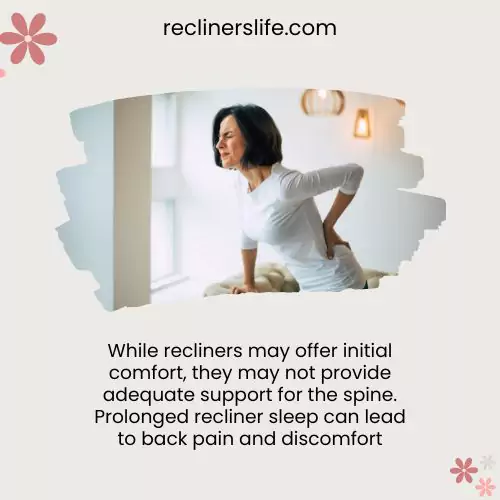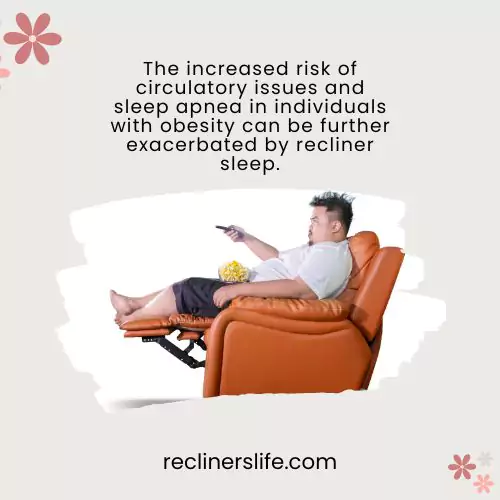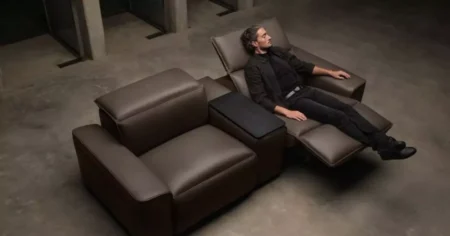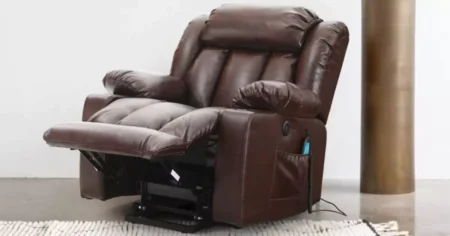Sleeping in a recliner is not ideal for your heart health. Reclined positions can cause poor blood circulation and increased pressure on your heart, potentially leading to cardiovascular issues.
Additionally, recliners may not provide adequate support for your spine, leading to discomfort and disrupted sleep.
It is recommended to sleep in a flat, comfortable bed to promote better heart health.
In this article, we will further explore the potential risks associated with recliner sleep.
What Are The Risks of Sleeping In a Recliner?
There are several risks associated with sleeping in a recliner. These include:
1. Impaired Circulation
Sleeping in a recliner for extended periods of time can lead to impaired circulation. The reclined position may cause compression of blood vessels, restricting blood flow to certain areas of the body.
This can result in numbness, tingling, and discomfort, particularly in the legs and feet.
2. Increased Risk of Blood Clots
Prolonged sitting or reclining can also increase the risk of developing blood clots, medically known as deep vein thrombosis (DVT).
When you remain sedentary for long periods, blood flow slows down, making it easier for clots to form.
These clots can potentially travel to the heart or lungs, causing serious health complications.
3. Sleep Apnea
Sleeping in a reclined position may worsen sleep apnea symptoms or contribute to its development. Sleep apnea is a condition characterized by interrupted breathing during sleep, leading to poor oxygenation.
The reclined posture can obstruct the airways and exacerbate breathing difficulties, resulting in snoring, gasping, and disrupted sleep patterns.
4. Back Pain
While recliners may offer initial comfort, they may not provide adequate support for the spine.
Prolonged recliner sleep can lead to back pain and discomfort, especially if the chair lacks proper lumbar support.

Improper spinal alignment can strain the muscles and contribute to long-term back issues.
5. Pressure Sores
Sleeping in one position for a long period of time can increase the risk of pressure sores, which are sores that develop on the skin due to prolonged pressure.
This is a serious condition that can lead to infection and tissue damage.
Also Read:
Who Should Avoid Sleeping In a Recliner?
While recliner sleeping may not be suitable for everyone, certain individuals should be particularly cautious and consider alternative sleeping arrangements:
1. People With Heart Disease
Individuals with heart disease or a history of cardiovascular issues should exercise caution when it comes to recliner sleeping.
The compromised circulation and increased risk of blood clots associated with recliner sleep can put additional strain on the heart and exacerbate existing conditions.
2. People With Back Pain
Individuals who already experience back pain or have a history of spinal issues should be cautious when considering recliner sleep.
3. People With Obesity
Obese individuals should be aware of the potential risks associated with sleeping in a recliner.
The chair’s structure may not adequately support its weight, leading to poor spinal alignment and added strain on the body.

Additionally, the increased risk of circulatory issues and sleep apnea in individuals with obesity can be further exacerbated by recliner sleep.
How Can You Sleep Safely In a Recliner?
If you still prefer to sleep in a recliner despite the potential risks, here are some tips to ensure a safer experience:
1. Use a Pillow to Support Your Head and Neck
To maintain proper alignment and support for your head and neck, it is recommended to use a pillow when sleeping in a recliner.
Choose a pillow that provides adequate cushioning and ensures your neck is not excessively flexed or extended.
2. Keep Your Legs Straight
To promote better circulation and reduce the risk of blood clots, try to keep your legs straight while the recliner sleeping.
Avoid crossing your legs or keeping them in a bent position for extended periods.
3. Avoid Sleeping For Long Periods of Time
Limit the duration of recliner sleep and avoid prolonged periods of immobility.
Taking breaks and engaging in light stretching or walking can help improve circulation and prevent stiffness or discomfort.
Pros and Cons of Sleeping in a Recliner for Heart Health
| Pros | Cons |
|---|---|
| Elevation can reduce acid reflux | Poor blood circulation |
| May ease breathing | Increased pressure on the heart |
| Helpful for certain health issues | Inadequate spine support |
| Convenient for short naps | Discomfort and disrupted sleep |
| Comfortable for elderly | Not suitable for prolonged sleep periods |
Conclusion
So in the end, people with heart disease, a history of blood clots, sleep apnea, back pain, or obesity should exercise caution and consider alternative sleep positions or consult with their healthcare provider.
Remember, maintaining a healthy sleep routine, regular exercise, and adopting good posture habits are essential for promoting heart health and overall sleep quality.
Always prioritize your well-being and choose the sleeping position that works best for your individual needs.
Frequently Asked Questions
Can sleeping in a recliner cause health problems?
Yes, sleeping in a recliner cause health problems such as impaired circulation, increased risk of blood clots, exacerbation of sleep apnea symptoms, and back pain. It is important to understand and manage these risks accordingly.
Can sitting in a recliner cause blood clots?
Yes, prolonged sitting in a recliner causes blood clots. Reduced movement and prolonged immobility contribute to slower blood flow, making it easier for clots to form.
Why do the elderly sleep in recliners?
Elderly individuals often find recliners comfortable and supportive of their aging bodies. Recliners can provide relief from joint pain, help with mobility issues, and offer a sense of independence and convenience.
Note: The above content is for informational purposes only and should not be considered medical advice. Please consult with a healthcare professional for personalized guidance and recommendations.





